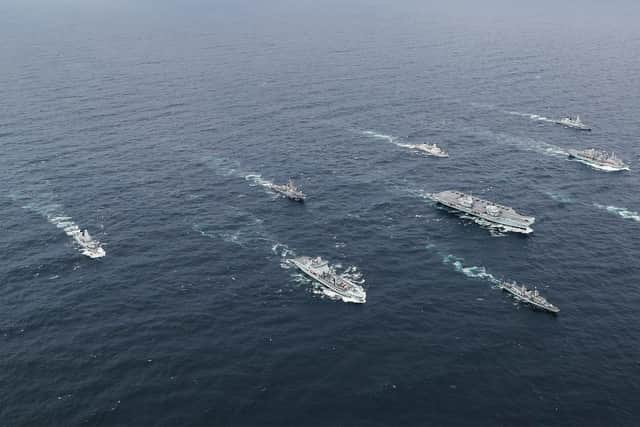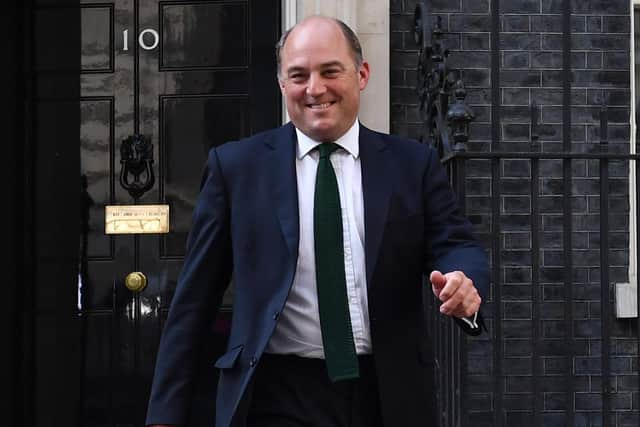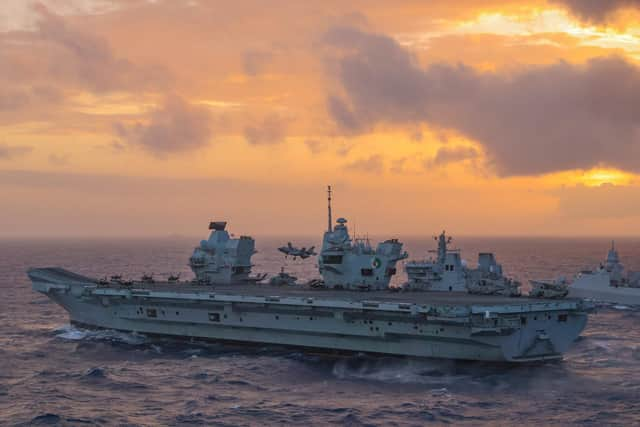Royal Navy: One in five sailors on UK carrier strike group have been infected with Covid-19
This article contains affiliate links. We may earn a small commission on items purchased through this article, but that does not affect our editorial judgement.
and live on Freeview channel 276
A total of 710 people out of more than 3,000 British military staff on the mission to the Far East have been infected with coronavirus in the five months the flotilla has been at sea.
Much of the task force, led by aircraft carrier and British flagship HMS Queen Elizabeth, is currently in India on the latest pitstop of its tour to the Indo-Pacific region.
Advertisement
Hide AdAdvertisement
Hide AdHowever, warships have been blighted by several outbreaks following shore visits by naval personnel, resulting in some vessels being placed on temporary quarantine.


The Royal Navy has downplayed the issue and insisted the number of infections had had a ‘negligible impact’ on operations, with all personnel double-vaccinated against Covid-19.
However, the news has worried Labour’s shadow armed forces minister, Stephen Morgan.
The Portsmouth South MP said: ‘These figures are concerning. Whilst there will of course be logistical challenges in managing Covid-19 infections when personnel are away at sea, it cannot be right that they are this much higher compared to the levels we are seeing back in Britain.
Advertisement
Hide AdAdvertisement
Hide Ad

‘It’s vital that our armed forces are given the proper protections and support that is needed to keep them safe, which allows them to deliver the incredible work they do, but government is letting them down.
‘Ministers must get a grip of this quickly to ensure this does not impact future operational capabilities and that we are protecting our servicemen and women.’
A former First Sea Lord has since urged naval families to remain calm and to not ‘overreact’ at the news.
Speaking to The News, Admiral Lord Alan West – who led the navy between 2002 and 2006 – said: ‘I think we have been quite careful about these things, we shouldn’t overreact.
Advertisement
Hide AdAdvertisement
Hide Ad

‘These people have all been vaccinated. They’re not going to need to be placed on ventilators or to be hospitalised. That’s the reality.
‘The navy’s response, saying it’s not affecting operations, is right; it’s like having a cold – we just have to get on with business.
‘Of course we should take care and try to avoid infections. But if there are infections I’m sure the navy and naval doctors will be monitoring it fairly closely. It’s a case of “keep calm and carry on”.’
In July a large-scale outbreak hit HMS Queen Elizabeth, with more than 100 crew members infected with the virus.
Advertisement
Hide AdAdvertisement
Hide AdAs well as the 100 personnel on the carrier, a number of crew members on four accompanying British ships also caught Covid-19.
The first cases were identified on around July 4, with sailors having become infected when they went ashore during a stopover at Limassol in Cyprus.
Speaking at the time, defence secretary Ben Wallace said an outbreak was ‘inevitable’ for a group of vessels on a global, months-long voyage.
Mr Wallace said new infections had been slowing and that the strike group’s maiden voyage was being kept under review.
Advertisement
Hide AdAdvertisement
Hide AdHe added: ‘It is inevitable at some stage in these eight-nine months of deployment that somebody would contract coronavirus…To expect it not to happen would actually be far more deluded.’
The latest Covid infection numbers were revealed by Tory defence minister Baroness Annabel Goldie during a parliamentary response to Labour shadow defence minister Lord Tunnicliffe.
She said: ‘As of October 15 2021, 710 UK armed forces personnel were reported as having tested positive to Covid-19 since the UK carrier strike group deployed in May 2021.’
Cabinet minister and Portsmouth North MP Penny Mordaunt said the navy ‘must ensure all is being done to stop infections and ensure the impact of Covid-19 is reduced’.
Advertisement
Hide AdAdvertisement
Hide AdThe Senior Service said outbreaks on ships have been managed on a case-by-case basis and that it had been ‘necessary to cancel’ some events planned to ‘protect visitors from possible infection’.
A Royal Navy spokeswoman said: ‘The carrier strike group left the UK with a clean bill of health, only confirming the first Covid cases following a port call.
‘The Covid rates across the group are not dissimilar to the UK civilian rates and there has been negligible impact on the deployment.
‘All ships in the group have been rigidly following the government guidelines throughout the deployment to good effect and that’s one of the factors enabling the low transmission rate on close-quartered warships.’
Advertisement
Hide AdAdvertisement
Hide AdLast week the UK recorded more than 52,000 new daily cases of Covid-19, the highest figure since July.
Latest data from the Office of National Statistics revealed that one in 55 people in England were estimated to be infected with the virus.
Looking for the latest Royal Navy updates from Portsmouth? Join our new Royal Navy news Facebook group to keep up to date.
A message from the Editor, Mark Waldron
You can subscribe here for unlimited access to our online coverage, including Pompey, with 70 per cent fewer adverts for less than 20p a day.
Comment Guidelines
National World encourages reader discussion on our stories. User feedback, insights and back-and-forth exchanges add a rich layer of context to reporting. Please review our Community Guidelines before commenting.
